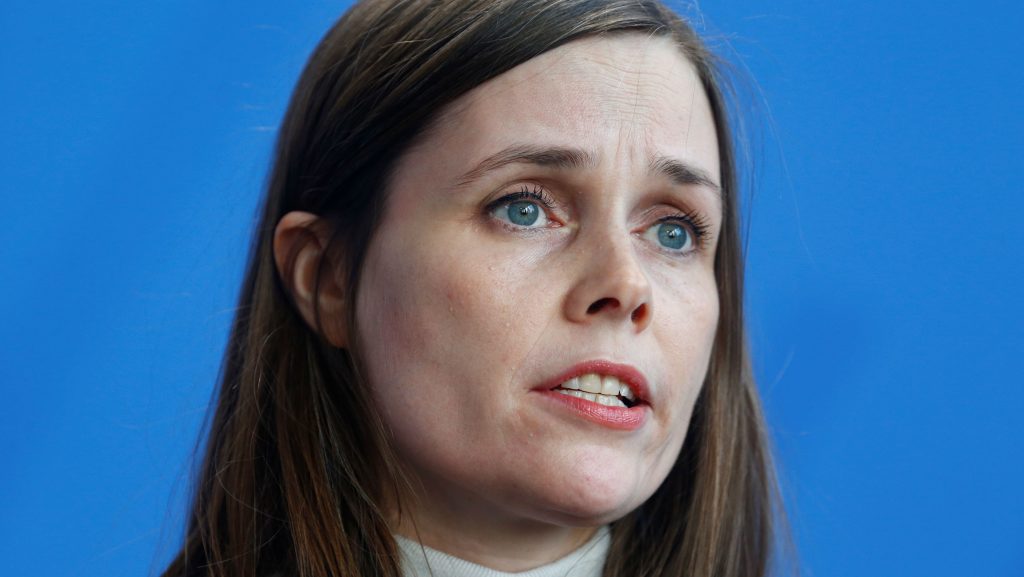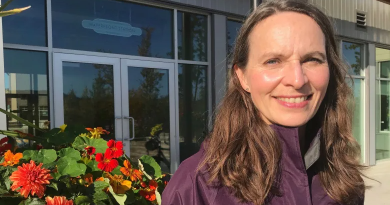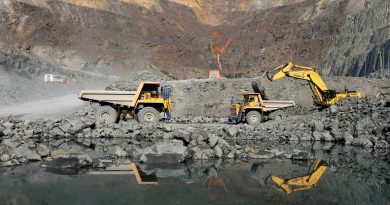Iceland talks Arctic, Trump’s ditching of climate accord, with U.S. Secretary of State

Iceland’s Prime Minister Katrin Jakobsdottir discussed climate change with U.S. Secretary of State Mike Pompeo in Reykjavik on Friday, saying the continued U.S. withdrawal from the Paris climate change agreement was a disappointment.
“In order to make progress in the fight against climate change, we need all states to participate in climate action,” Jakobsdottir said in a news release on Friday. “We are at a point where we must act. I encouraged Secretary Pompeo to participate in our efforts.”
The Paris climate agreement was reached by 197 countries in 2015. Its main goal is to keep global temperature increase to less than 2 degrees Celsius above pre-industrial levels.
Trump announced he was withdrawing the U.S. from the agreement on June 2, 2017.
Arctic issues high on the agenda
Pompeo’s visit to Jakobsdottir came after an official meeting with Iceland’s Foreign Minister Gudlaugur Thor Thordarson on Friday.
During the meeting the two foreign ministers discussed bilateral relations and Arctic affairs.
Iceland takes over the two-year rotating chairmanship of the Arctic Council from Finland this May. The Arctic Council is an international forum made up the world’s eight circumpolar nations and six Arctic Indigenous groups.
Both the United States and Iceland are members of the Arctic Council, an international forum made up of the world’s eight circumpolar nations and six Arctic Indigenous groups who work together on environmental and sustainable development in the North.
Year formed: 1996
Arctic Council Members: Canada, Denmark (Greenland), Finland, Iceland, Norway, Sweden, Russia, United States
Permanent Participants: Aleut International Association, Arctic Athabaskan Council, Gwich’in Council International, Inuit Circumpolar Council, Russian Association of Indigenous Peoples of the North, Saami Council
Current Chair: Finland (2017-2019)
“Iceland and the United States are partners in the Arctic Council and agree to continue to pursue sustainable development and stability in the Arctic,” Thordarson said in the news release.
“The Arctic ocean is a unifying factor and ocean affairs will be one of Iceland’s priorities in our presidency. We expect to benefit from co-operation with the United States and other members of the Arctic Council. We are also faced with various challenges, including search and rescue, which countries must coordinate in the Arctic is vast with limited infrastructure.”
NATO alliance
The two ministers also discussed NATO cooperation and defence co-operation between the two countries in Europe and the North Atlantic.
The United States has committed to Iceland’s defence on behalf of NATO since 1951’s bilateral defence agreement. In 2016, the two countries signed a Joint Declaration on Security Cooperation where the United States reaffirmed its commitment to Iceland’s defence, and Iceland agreed to continue allowing the U.S. and NATO to use Icelandic facilities “in order to reinforce mutual security.”

There have been increasing tensions between Russia and western countries since the 2013 Ukraine crisis. Russia’s investment in military infrastructure in the Arctic has also raised concern in some quarters.
“The United States deeply understands the strategic – geostrategic challenges that exist in the Arctic, the risks that are there,” said Pompeo at a press conference after the meeting, in a transcript on the U.S. Department of State website. “And we’ve watched America’s adversaries begin to deploy assets in a way that they believe will strategically disadvantage not only the United States but Iceland and the European countries as well.”
Despite increasing tensions, Thordarson said Iceland was committed to keeping the North Atlantic a low-tension area.
“When it comes to bilateral relations on defence and security and our membership in NATO, it’s always the same – or same aim: We want to see peace, especially in this part of the world, and of course, in the world as a whole,” said Thordarson at the press conference.
“That’s the reason we joined NATO in the first place. That’s the reason we made the bilateral agreement between us and the U.S. And lower tension means that we don’t need to do as much, but unfortunately, things have changed a bit since 2014, as we all know, and – but we will hope that we will see change in another direction in the future.
“But as we speak, then the situation is as it is.”
Write to Eilís Quinn at eilis.quinn(at)cbc.ca
Related stories from around the North:
Canada: Canadian military to build multi-million dollar facility in Northern city, CBC News
Finland: Finland to host major war games in 2021, Yle News
Greenland: Controversy over Greenland airports shows China still unwelcome in the Arctic, Cryopolitics blog
Iceland: Iceland, U.S. FMs talk Arctic security, defence cooperation at Washington meeting, Eye on the Arctic
Norway: NATO’s Arctic dilemma, Radio Canada International
Russia: Troops in Russia’s High Arctic undergo “military-patriotic” training, The Independent Barents Observer
Sweden: Swedish military wants to double in size, Radio Sweden
United States: New symposium brings U.S. military’s attention to the Arctic, Alaska Public Media



